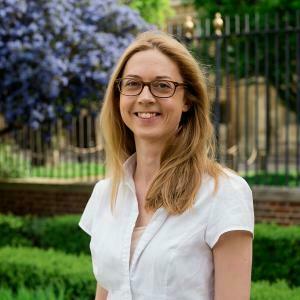
Niamh Gallagher is University Associate Professor in Modern British and Irish History, Faculty of History at St. Catharine's College, University of Cambridge. She convenes and lectures on a range of courses across the undergraduate and postgraduate year groups focusing predominantly on the political and social history of Britain, Ireland, and the Irish.
From Co. Armagh in Northern Ireland, Professor Gallagher is the author of Ireland and the Great War: A Social and Political History (Bloomsbury, 2019), which won the Royal Historical Society's Whitfield Prize in 2020 for an original and scholarly work of British or Irish history produced by a first-time author. She is also co-editor of The Political Thought of the Irish Revolution with Professor Richard Bourke published by Cambridge University Press earlier this year.
Professor Gallagher has appeared frequently in the media. She co-convenes The Future of the Island of Ireland seminar series, which was awarded an Arts and Humanities Impact Fund grant in 2022. In 2021, she was a member of the Independent Historical Advisory Panel for Northern Ireland appointed by the UK government to advise on and engage with activities pertinent to the partition of Ireland and creation of Northern Ireland in 1921.
She has been featured in two webinars with the Institute’s Clingen Family Center for the Study of Modern Ireland: in March 2021, a panel discussion titled "A Farther Shore: The Emergence of Northern Ireland," and in November 2021, a conversation with Dr. Heather Stanfiel on her award-winning book.
In her first visit to the Notre Dame campus this fall, Professor Gallagher will meet with undergraduate and graduate students and deliver a talk on Tuesday, 27 September titled "Ireland and the Great War: Myth, Memory, and History."
From Cambridge, she answers our Three Questions:
What are you working on?
I’m struggling to move on from the First World War but can’t quite seem to let it go! I’ve produced a couple of articles based on niggling questions that speak to current trends in the wider sphere of First World War studies, centered largely around questions of coping and home–front connections. But I’m almost ready to make my peace with it and to turn my focus to something entirely different: the role of Ireland and the Irish in the end of the British Empire, a project that will take my research from policymakers to anti-colonial activists, to Irish settlers within the Empire and Irish-America. In the meantime, I should add that I’ve co-edited a blue book with Professor Richard Bourke called The Political Thought of the Irish Revolution published by Cambridge University Press earlier this year. The blue books are part of the renowned series in political thought, and this is the first time the series has published on Ireland, which now sits alongside the more famous studies of Kant, Hegel, and other thinkers. This fascinating study allowed us to untangle the various intellectual arguments advanced by a wide range of actors during the Irish Revolution, challenging the rather myopic extant assessment that the Revolution was devoid of ‘ideas’. Far from it.
What are you reading?
For my academic reading, I’ve been looking again at the wonderful works by Alexander Watson, Patrick Houlihan, and Michael Snape to assist my research on the First World War. To broaden the conceptual mind – for that is really what we’re required to do! – I’ve enjoyed Worldmaking by Adom Getachew, The Age of Questions by Holly Case and look forward to getting my teeth into Hazel Carby’s Imperial Intimacies. I might also give a shout to a well-written and rather hilarious book of fiction by Bonnie Garmus called Lessons in Chemistry which I recommend every man and woman to read to remind us how far women’s rights have come (and how far they’re yet to go). My weekly pleasures include dipping into the London Review of Books (LRB), New Statesman and Economist, as well as newspapers in Britain, Ireland, and America.
What are you looking forward to this coming academic year?
The last few years have been a series of centenary bonanzas in Ireland (and in Britain too, except the rather important centenaries of partition, the reconfiguring of the first UK etc. have passed almost entirely unnoticed!). This continues somewhat in 2022–3, though thankfully winds down a bit, as there are better experts than me to discuss the more intimate details of the civil war. I’m booked to contribute to separate media projects with David Olusoga and Michael Portillo, which are always fun. At the same time, the seriousness of the UK government’s actions over the Withdrawal Agreement (i.e. Brexit) are such that I’ve found myself commenting on them publicly and am now waiting to give evidence to the House of Lords as the Northern Ireland Protocol Bill is scrutinized in the UK parliament’s second chamber. These are all fun experiences and meaningful work for historians interested in doing public history. For my research, I’m looking forward to making headway on the next project, and I’m at the exciting phase when you don’t know where your ideas or findings will take you!